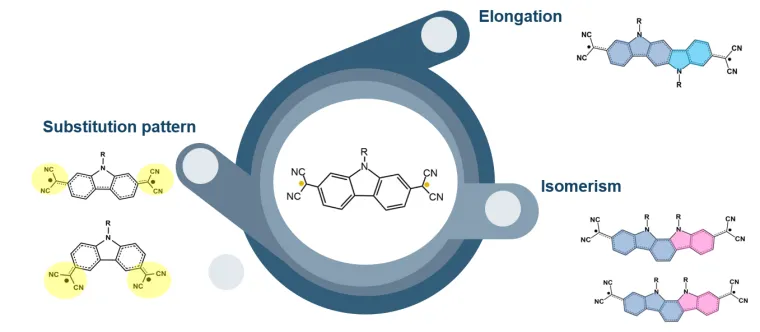When
Presenter: M. Carmen Ruiz Delgado, University of Málaga, Department of Physical Chemistry, Málaga, Spain
π-Conjugated diradical compounds, featuring unique unsaturated valences and radical centres in the ground state, are fundamentally important for understanding the nature of chemical bonds and have potential applications in material science. [1] Over the last decade, there has been an growing interest in analysing how structural changes stabilize (or destabilize) the diradical system. Interestingly, π-conjugated diradical compounds have emerged as essential building blocks in dynamic covalent chemistry (DCC).[2] In this context, it has recently been shown that carbazole-based diradicaloids are capable of forming long C-C bonds between unpaired electrons from the radical centers of monomers giving rise to cyclophane aggregates.[3] We present here an experimental/theoretical study of a family of carbazole-based diradicals substituted with dicyanomethylene (DCM) groups aiming to investigate how subtle chemical changes (i.e., different substitution pattern, core elongation or isomerism) affect their chemical reactivity and physical properties as well as the stability of the resulting cyclophane aggregate achieved, see Figure 1.

Figure 1. Chemical structures of carbazole-based diradicals under study.
References
[1] T. Stuyver, B. Chen, T. Zeng, P. Geerlings, F. De Proft, R. Hoffmann, Chem. Rev. 2019, 119, 21, 11291-11351
[2] D. Sakamaki, S. Ghosh, S. Seki, Mater. Chem. Front. 2019, 3, 2270.
[3] a) T. Kobashi, D. Sakamaki, S. Seki, Angew. Chem. Int. Ed. 2016, 55, 8634; b) I. Badía-Domínguez, A. Pérez-Guardiola, J. C. Sancho-García, J. T. López Navarrete, V. Hernández Jolín, H. Li, D. Sakamaki, S. Seki, M. C. Ruiz Delgado, ACS Omega 2019, 4, 4761; c) I. Badía-Domínguez, M. Peña-Álvarez, D. Wang, A. Pérez Guardiola, Y. Vida, S. Rodríguez-González, J.T. López Navarrete, J., V. Hernández Jolín, J.C Sancho García, V. García Baonza, R. Nash, F. Hartl, H. Li, M.C. Ruiz Delgado, Chem. Eur. J. 2021, 27, 5509-5520.t
Bio Sketch: I graduated in Chemical Engineering in 2001 and obtained my PhD in 2006, both at the University of Málaga (UMA). Thanks to the award of a MEC/Fulbright postdoctoral fellowship

(2007-2010), I did a postdoctoral stay at the Georgia Institute of Technology (Atlanta, USA) in the group of Prof. Jean-Luc Brédas. In 2010, I joined the UMA as a Ramón y Cajal Researcher, focusing my research field on the theoretical-experimental synergy of organic materials for the practical application and design of electronic devices. Thus, I combine theoretical calculations (postdoc expertise) with experimental physico-chemical analyses (predoc expertise) for a proper analysis of the complex structure/properties relationships of molecular materials. This highly interdisciplinary field field of research aims to guide synthetic chemists to create new molecules and materials with more efficient, reliable and environmentally friendly properties and applications.
I have participated in 15 national and international research projects, and I am the author of more than 100 scientific articles (JCR indexed) published in high impact journals. I have participated in numerous international scientific conferences, as well as given lectures at prestigious international universities. In recent years, with the aim of further deepening the search for new materials for organic electronics, I have carried out research stays at the University of Stuttgart (Germany), the University of Cergy-Pontoise (France) and the Polytechnic Institute of Milan (Italy).
It is worth mentioning my involvement in tasks related to the training of young researchers, with the supervision of 6 Doctoral Theses and 10 Master's Theses, as well as my participation in the organisation of different workshops focused on promoting the dissemination of research carried out by young chemists. I have taught more tan 1800 hours of classes in different Master´s degrees and bachelor's degrees at UMA.
I frequently participate in dissemination activities aiming to make visible the scientific results to the society and/or to support the gender equlity and women´s empowerment, such as “La Noche Europea de los Investigadores” or “Female Leaders in Science”. I have extensive experience in university and scientific management. Since 2010 I act as a reviewer in the evaluation process of research projects for the ANEP, and I am currently treasurer of the GENAM Group of the RSEQ, and of the European scientific society of "Computing pi-conjugated Compounds". In addition, I have been Vice-Secretary of the Faculty of Science, and Deputy Vice-Rector for Research Staff for the last six years at the UMA.
Host: Dr. Jean-Luc Bredas






